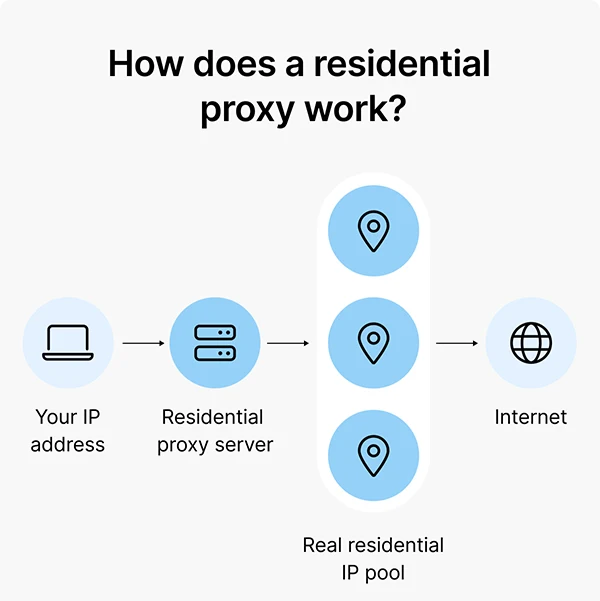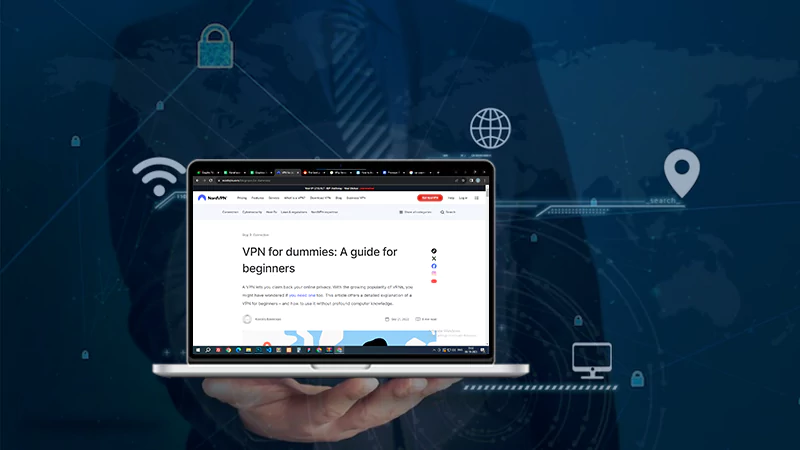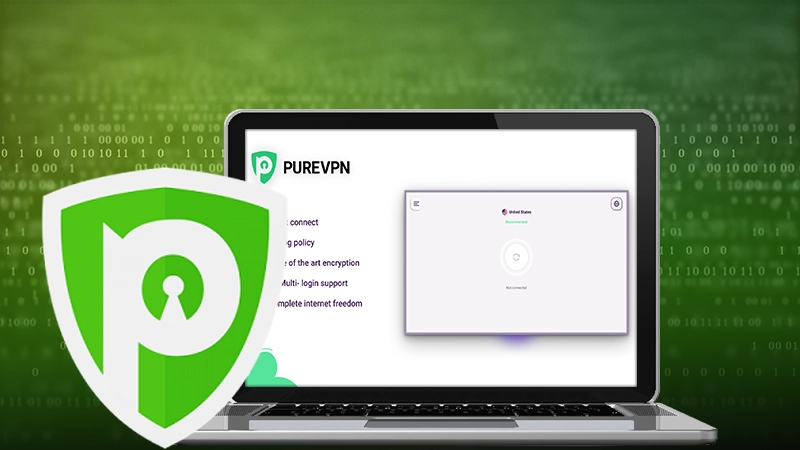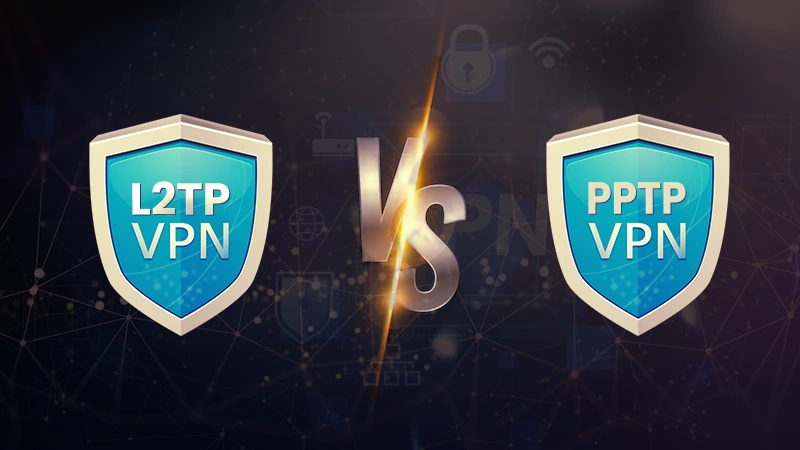What Is Residential Proxy? Definition And Guide 2024
Are you feeling concerned about protecting your identity and privacy online?
Well, you’re not alone!
Many users on the internet have switched to residential proxies to help keep their private data safe.
Simply put, a residential proxy is like a middleman between your device and the internet.
This middleman helps hide your location and prevents your online activities from being tracked.
But still, residential proxy networks are much more than that.
Fortunately, we will reveal all you need to know about picking a residential proxy service for all your online pursuits.
Read the article below to know everything about residential proxies.

What is a Residential Proxy?
A residential proxy hides an online user’s IP address (or that of someone, such as a bot).
This works because traffic is routed via an “intermediary server,” which may be any device that can receive web traffic and forward it to a different website or device.
Instead of the real origin device, the destination website receives the device’s IP address since the activity is being halted and redirected through it.
It can prevent any admins, hackers, and other people from peeking at the actual IP of your website’s visitors.
This means that residential proxies can direct website traffic through home IP addresses registered with ISPs that provide services to end users.
DID YOU KNOW?
Residential proxies are more popular than data center proxies, with over 72 million IP addresses compared to 770,000+ for data center proxies.
Proxy servers, like data centers designed expressly for use by enterprises with high processing demands, could differ from this.
Although there are proxy services that are “transparent” or that make the traffic source’s IP data available to others, fraudsters usually use anonymous proxy services to conceal their IP address.
So, if you want to learn more about what proxies are and how they work, click here.

Types of Residential Proxies
Residential proxies are usually used for commercial purposes, and some of them can have browser information, a preferred location, and cookies. There are two types:
Static Residential Proxy
A single residential IP address is used to hide your actual IP address with static residential proxies.
You will only be connected to that IP address until you disconnect or move to a different server.
It’s helpful, particularly for social networking platforms where maintaining the same IP address when signed in with the same profile is mandatory.
With this, you won’t be able to access geo-restricted content from other nations or areas.
Rotating Residential Proxy
You know, with a rotating residential proxy, your real IP address is hidden behind various constantly changing or rotating addresses.
These IP addresses are part of many subnets linked together by a sophisticated global IP address network.
Rotating proxies are often used in pricing aggregation and web scraping applications.

Residential Proxies Use Cases
Residential IP proxies have a wide range of applications. Some of them are stated below:
- Social Media Management: Without question, social media plays a pretty major role in modern digital marketing and vice versa. Using residential proxies makes it possible to manage many social media accounts on one device.
- Market Price Monitoring: Residential proxies are useful if your company depends on clients. To keep your customers coming back, it’s simple to gather data, keep an eye on price trends, and comply with them. You can apply several sales intelligence tools with residential proxies.
- Cybersecurity Penetration Testing: One method that cybersecurity organizations employ to conceal IP addresses is through the use of residential proxies. A cybersecurity penetration test mimics the situations and techniques that hackers employ regularly.
- Web Data Scraping: Residential proxies are used by businesses to collect data and keep tabs on rivals. Since IPs can be cycled regularly, huge quantities of data can be gathered.
- Ad Verification: Residential proxies are necessary for media monitoring since they allow you to examine and confirm the advertisements shown on your page. This identifies and removes advertising that seems suspect and might harm your company’s reputation.
- Site Unblocking: Websites and materials are frequently geo-locked by service providers, making them only available from specific regions of the globe. Using residential proxies, you can communicate with them while traveling without getting detected or blocked. Residential proxies are extremely important in nations with restrictions on the free flow of information.

What to Consider Before Buying Residential Proxies
You know, the use of residential proxies is very common today.
Residential proxies have proved their worth, from being used in offices to access a website for work to getting used at home to improve website traffic.
However, since these proxies are in high demand, we often tend to buy them without considering various key factors.
Some of these pointers are stated below.
Budget
Residential proxies can be pretty costly so you always need to go for the one that fits in with your budget.
You can easily compare costs and choose the offer that suits you the best.
Purpose and Use
So, what exactly is the purpose of residential proxies?
If you’re asking yourself this question, then you probably need to rethink your decision if it is for small-scale scraping and rudimentary security.
Residential proxies may be unnecessary in such a case.
Besides, residential proxies are needed if you want a proxy bundle for some extensive scraping, anonymity, and security.
Always try to understand the necessity of residential proxies.
Spending so much money when you might be able to get by with an inexpensive shared proxy package is not wise.
This also holds when you buy various home proxy packages.
Compatibility with Automation Tools
And, if you plan on creating a website using a residential proxy to ensure its efficient functioning, choose a proxy with an SEO offer.
These SEO proxies help with keyword research, ranking, and audits to increase your website traffic.
How Does a Residential Proxy Work?

Residential proxies work as a mediator between all your devices and the websites you connect to.
These mediators can help you stay anonymous by hiding your identity and location while you browse.
It pretty much borrows someone else’s IP from a list and makes it look like yours so that you can be anyone browsing from anywhere.
Conclusion
To protect the user’s privacy and security when using the internet, residential proxies serve as middlemen and conceal actual IP addresses.
They help with data scraping, ad verification, cybersecurity testing, market monitoring, social media management, and static and rotating choices.
But still, buying them necessitates carefully weighing your alternatives and particular demands.
Users may make well-informed judgments to guarantee improved online safety and effective browsing experiences by being aware of their types, apps, and major factors.
So, if you are one of the internet users who always wants to stay ahead of time and doesn’t like delays, then a residential proxy might be what you need.
What Is Mobile Proxy And How Do They…
Protect Yourself from Cybercrime: Top 5 Smart Strategies…
Strategies for Cyber Success: Safeguarding and Managing Your…
Cybersecurity Course Online: Navigating the Digital Threat Terrain
Are You Being Spied On? 5 Reasons Why…
Fortifying Your Online Fortress: Unveiling the Best Paid…
The Imperative of Cybersecurity Integration in Front-End Development…
10 Tricks for Staying Cyber-Secure While Binge-Watching
Securing Your System: The Importance of Anti-Malware Software
Benefits of VPN for Enterprise Networks: Enhanced Security
PureVPN – The Best Streaming VPN
L2TP vs. PPTP: Which VPN Protocol is More…












